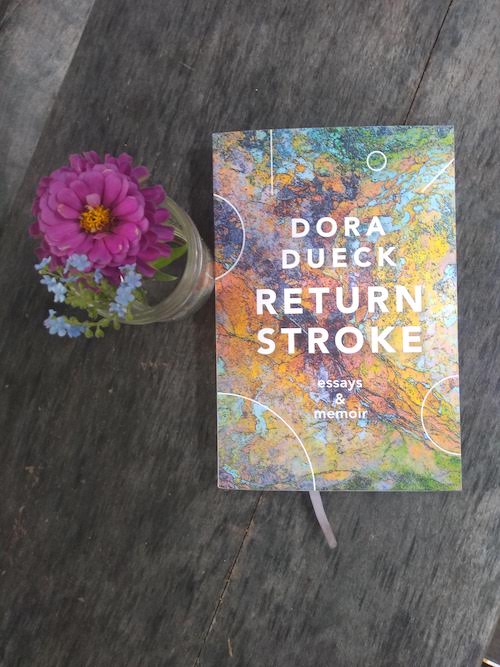September 26, 2022
Return Stroke, by Dora Dueck

In 2019, I founded a pretty sweet boutique bookselling operation called BRINY BOOKS, and Dora Dueck’s most recent novel, ALL THAT BELONGS, was part of our second lineup of titles, a novel I loved, just as I’d loved her previous book, the story collection WHAT YOU GET AT HOME, and I’ve also enjoyed her nonfiction over the years, at her blog and in literary journals, and so I’ve been looking forward to her most recent release, RETURN STROKE: ESSAYS AND MEMOIR, published by Canadian Mennonite University Press, and it’s everything I was hoping it would be. Dueck reflecting back from her 70s on her girlhood growing up in Alberta, her marriage and years of intensive motherhood, which included a stint living in her husband’s native Paraguay, and all the wonder and culture shock that experience entailed, and then her own evolving thinking about feminism, and faith, and her relationship to her church after her daughter comes out as queer, and she writes about getting older, the lightness of aging, and the heaviness too in an essay about the final days before her husband’s death, a gorgeous evocation. This is a book that brought me to tears more than once or twice.
What I love so much about Dueck’s writing and her thinking is that nothing is fixed, and she is eternally curious, taking notes and learning, about the past and the presence, much of her work concerned with memory and history, but in such a vital, living way, not as an affirmation but a process of discovery. The first half of the book is a series of essays, and the second (roughly the same length) is a work of memoir about her time in Paraguay in the early 1980s, and she writes about the revelation, as she returns to the letters and diaries that are her primary sources, “I’d been thirty-two…, which was, I suddenly noted, the current age of our youngest child, and that child seemed—well, young!” An entire page about how relative are the ideas of old and young—which was a mirror image to the revelations of Emma Straub’s protagonist in her latest novel This Time Tomorrow—and then this beautiful paragraph:
“That I was young is the truth, and yet, in the memoir-writing-effort of existing out of time, my youthfulness at thirties-young seemed an invention. And having coaxed this fiction/truth into text, I found myself suddenly standing next to my thirty-something children and in the flashes—swift and jaggedly stunning as lightning strokes—of knowing myself then and my children now, we seemed to meet as age-equals. As if we’d bumped into each other on some magnificent high bridge. The meeting amazed me, made me dizzy too. I was proud of these children, of who they were at the moment, and it pleased me more than I can express that the Me of the Chaco could, in this moment of meeting, be compared to them.”
Though I’m pretty sure the pleasure is entirely mutual, seeing what a privilege and a most illuminating delight it is to bump into Dueck in these pages.





